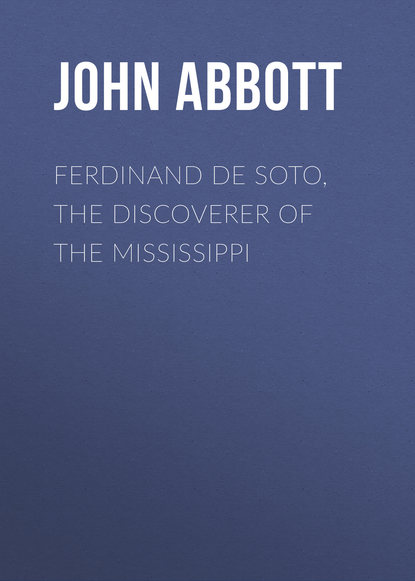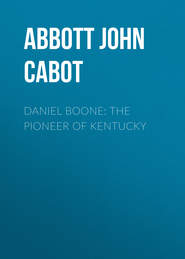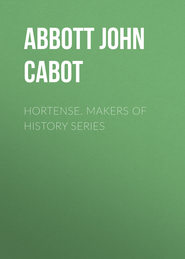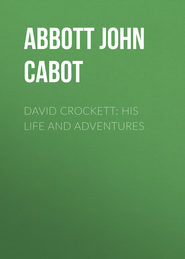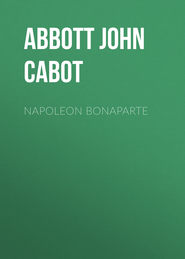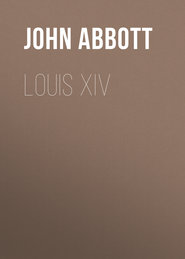По всем вопросам обращайтесь на: info@litportal.ru
(©) 2003-2024.
✖
Ferdinand De Soto, The Discoverer of the Mississippi
Настройки чтения
Размер шрифта
Высота строк
Поля
In response to Cofa's message, Cofaqui dispatched four of his subordinate chiefs, with a message of welcome to the Spaniards. He sent out his runners to bring him speedy intelligence of their approach. As soon as he received news that they were drawing near, he started himself, with a retinue of warriors in their richest decorations, to welcome the strangers. The meeting, on both sides, was equally cordial. Side by side, almost hand in hand, the Floridians and the Spaniards entered the pleasant streets of Cofaqui. The chief led De Soto to his own mansion, and left him in possession there while he retired to another dwelling.
The intercourse between these two illustrious men seemed to be as cordial as that between two loving brothers. The Floridian chief, with great frankness, gave De Soto information respecting the extent, population and resources of his domain. He informed him that the province of Cofachiqui, of which he was in search, could only be reached by a journey of seven days, through a dreary wilderness. But he offered, should De Soto decide to continue his journey, to send a strong band of his army, to accompany him with ample supplies. De Soto afterwards ascertained that there was some duplicity in this proposal; or rather, that the chief had a double object in view. It appeared, that there had been long and hereditary antagonism between the province of Cofaqui, and that of Cofachiqui; and the chief availed himself of that opportunity to invade the territory of his rival.
Scouts were sent out in all directions to assemble the warriors, and De Soto was surprised to find an army of four thousand soldiers, and as many burden-bearers, ready to accompany him. The provisions, with which they were fully supplied, consisted mainly of corn, dried plums and nuts of various kinds. Indian hunters accompanied the expedition to search the forests for game.
The Spaniards at first were not a little alarmed in finding themselves in company with such an army of natives; outnumbering them eight to one, and they were apprehensive of treachery. Soon, however, their fears in that direction were allayed, for the chief frankly avowed the object of the expedition. Summoning before him Patofa, the captain of the native army, he said to him, in presence of the leading Spanish officers in the public square:
"You well know that a perpetual enmity has existed between our fathers and the Indians of Cofachiqui. That hatred you know has not abated in the least. The wrongs we have received from that vile tribe still rankle in our hearts, unavenged. The present opportunity must not be lost. You, at the head of my braves, must accompany this chief and his warriors, and, under their protection, wreak vengeance on our enemies."
Patofa, who was a man of very imposing appearance, stepped forward, and after going through several evolutions with a heavy broadsword carved from wood, exceedingly hard, said:
"I pledge my word to fulfill your commands, so far as may be in my power. I promise, by aid of the strangers, to revenge the insults and deaths, our fathers have sustained from the natives of Cofachiqui. My vengeance shall be such, that the memory of past evils shall be wiped away forever. My daring to reappear in your presence will be a token that your commands have been executed. Should the fates deny my hopes, never again shall you see me, never again shall the sun shine upon me. If the enemy deny me death, I will inflict upon myself the punishment my cowardice or evil fortune will merit."
It was indeed a large army which then commenced its march, for it consisted of four thousand native warriors, and four thousand retainers to carry supplies and clothing, and between eight and nine hundred Spaniards. The Indians were plumed and decorated in the highest style of military display. The horses of the Spaniards were gayly caparisoned, and their burnished armor glittered in the sun. Silken banners waving in the breeze and bugle peals echoing over the plains, added both to the beauty and the sublimity of the scene.
The Spaniards conducted their march as in an enemy's country, and according to the established usages of war. They formed in squadrons with a van and rear guard. The natives followed, also in martial array; for they were anxious to show the Spaniards that they were acquainted with military discipline and tactics. Thus in long procession, but without artillery trains or baggage wagons, they moved over the extended plains and threaded the defiles of the forest. At night they invariably encamped at a little distance from each other. Both parties posted their sentinels, and adopted every caution to guard against surprise.
Indeed, it appears that De Soto still had some distrust of his allies, whose presence was uninvited, and with whose company he would gladly have dispensed. The more he reflected upon his situation, the more embarrassing it seemed to him. He was entering a distant and unknown province, ostensibly on a friendly mission, and it was his most earnest desire to secure the good-will and coöperation of the natives. And yet he was accompanied by an army whose openly avowed object was to ravage the country and to butcher the people.
The region upon which they first entered, being a border land between the two hostile nations, was almost uninhabited, and was much of the way quite pathless. It consisted, however, of a pleasant diversity of hills, forests and rivers. The considerable band of hunters which accompanied the native army, succeeded in capturing quite an amount of game for the use of the troops. For seven days the two armies moved slowly over these widely extended plains, when they found themselves utterly bewildered and lost in the intricacies of a vast, dense, tangled forest, through which they could not find even an Indian's trail. The guides professed to be entirely at fault, and all seemed to be alike bewildered.
De Soto was quite indignant, feeling that he had been betrayed and led into an ambush for his destruction. He summoned Patofa to his presence and said to him:
"Why have you, under the guise of friendship, led us into this wilderness, whence we can discover no way of extricating ourselves? I will never believe that among eight thousand Indians there is not one to be found capable of showing us the way to Cofachiqui. It is not at all likely that you who have maintained perpetual war with that tribe, should know nothing of the public road and secret paths leading from one village to another."
Patofa made the following frank and convincing reply.
"The wars that have been waged between these two provinces, have not been carried on by pitched battles nor invasions of either party, but by skirmishes by small bands who resort to the streams and rivers we have crossed, to fish; and also by combats between hunting parties, as the wilderness we have traversed is the common hunting ground of both nations. The natives of Cofachiqui are more powerful and have always worsted us in fight. Our people were therefore dispirited and dared not pass over their own frontiers.
"Do you suspect that I have led your army into these deserts to perish? If so, take what you please. If my head will suffice, take it; if not you may behead every Indian, as they will obey my mandate to the death."
The manner of Patofa was in accordance with these feeling and manly words. De Soto no longer cherished a doubt of his sincerity, and became also convinced that their guides were utterly unable to extricate him. Under these circumstances nothing remained but blindly to press forward or to retrace his steps. They at length found some narrow openings in the forest through which they forced their way until they arrived, just before sunset, upon the banks of a deep and rapid stream which seemed to present an impassable barrier before them.
They had no canoes or rafts with which to cross the river; their food was nearly consumed, as it had been supposed that a supply for seven days would be amply sufficient to enable them to traverse the desert. To turn back was certain death by starvation; to remain where they were was equal destruction; to go forward seemed impossible, for they had not sufficient food to support them even while constructing rafts. It was the darkest hour in all their wanderings. Despair seemed to take possession of all hearts excepting that of De Soto. He still kept up his courage, assuming before his people an untroubled and even cheerful spirit.
The river afforded water to drink. A large grove of pine trees bordering the river, beneath whose fragrant shade they were encamped, sheltered them from the sun. The level and extended plain, dry and destitute of underbrush, presented excellent camping-ground. Food only was wanting. But without this food in a few short days the whole army must perish.
De Soto, that very evening leaving the armies there, took a detachment of horse and foot and set off himself in search of some relief or path of extrication. Late in the night he returned, perplexed and distressed, having accomplished nothing. A council of war was held. It was promptly decided that the armies should remain where they were while detachments were sent in all directions in search of food or of some path of escape.
These detachments left early in the morning and returned late at night having discovered neither road nor corn-field, nor habitation. De Soto then organized four bands of horse and two of foot to go up and down the river, and to penetrate the interior, and to make as wide an exploration as possible within the limit of five days. Each band was accompanied by a large number of natives. Patofa himself went with one of these detachments. A thousand Indian warriors were scattered through the forest in search of a road and such game as could be found. The Governor remained on the banks of the river anxiously awaiting their return.
"The four thousand Indians," writes Mr. Irving, "who remained with him, sallied out every morning and returned at night, some with herbs and roots that were eatable, others with fish, and others again with birds and small animals killed with their bows and arrows. These supplies were, however, by no means sufficient for the subsistence of such a multitude.
"De Soto fared equally with his men in every respect; and, though troubled and anxious for the fate of his great expedition, he wore a sunny countenance to cheer up his followers. These chivalrous spirits appreciated his care and kindness, and to solace him they concealed their sufferings, assumed an air of contentedness, and appeared as happy as though revelling in abundance."
Most of the exploring parties suffered no less from hunger than did their companions who remained behind. Juan De Añasco, after traversing the banks of the river for three days, had his heart gladdened by the sight of a small village. From an eminence he saw that the country beyond was fertile, well cultivated and dotted here and there with hamlets. In the village, for some unexplained reason, he found a large amount of provisions accumulated, consisting mainly of corn. He immediately dispatched four horsemen back to De Soto with the joyful tidings. They took with them such food as they could carry. This proved to be the first village in the long-sought-for province of Cofachiqui.
It will be remembered that Patofa, the commander-in-chief of the native army, had, with a large number of his warriors, accompanied Añasco. He had pledged his word to his chief that he would do everything in his power to harass, pillage and destroy their ancestral foes. Añasco encamped his band a little outside the village. At midnight Patofa and his warriors crept stealthily from the encampment, pillaged the temple which contained many treasures prized by the Indians, and killed and scalped every native whom they met, man, woman or child. When Añasco awoke in the morning and found what they had done, he was terrified. The outrage had been committed by troops under his own command. He was apprehensive that every man in the village, aided by such warriors as could be gathered from around, would rush upon him in revenge, and that he and his enfeebled followers would be destroyed. Immediately he commenced a retreat to meet De Soto, who he doubted not would be promptly on the move to join him.
The four couriers reached the camp in one day, though in their slow exploring tour it had required three days to accomplish the forty miles which they had traversed. The troops were overjoyed at the glad tidings, and immediately prepared to resume their march. Several of their detachments had not yet returned. In order to give them information of the direction which the army had taken, De Soto wrote a letter, placed it in a box, and buried it at the foot of a tree. Upon the bark of the tree, he had these words conspicuously cut: "Dig at the root of this pine, and you will find a letter."
The half famished troops, inspired with new energies, reached the village in a day and a half, where their hunger was appeased. The scattered detachments arrived a few days after. The force of De Soto was too strong for the natives to attack him, notwithstanding the provocation they had received. He found, however, much to his chagrin, that he was utterly unable to restrain the savage propensities of his allies. For seven days the Spaniards sojourned in this frontier village of Cofachiqui. Warlike bands were continually stealing out, penetrating the region around, killing and scalping men, women and children, and committing every conceivable outrage of barbaric warfare.
De Soto could endure this no longer. He called Patofa before him, and told him in very emphatic terms that he must return to his own province. He thanked the chieftain very cordially for his friendly escort, made him a present of knives, clothing, and other valuables, and dismissed him and his followers. Patofa was not unwilling to return. He was highly gratified with the presents he had received, and still more gratified that he had been permitted to wreak vengeance on his hereditary foes.
Two days after his departure, the Spanish army was again in motion, along the banks of the river. Every step they took revealed to them the awful ravages committed by the bands of Patofa. They passed many dwellings and many small hamlets, where the ground was covered with the scalpless bodies of the dead. The natives had fled in terror to the woods, so that not a living being was encountered. There was, however, a plentiful supply of food in the villages, and the army again enjoyed abundance.
The heroic Añasco was sent in advance to search out the way and, if possible, to capture some Indians as guides. He took with him a small band of thirty foot-soldiers, who were ordered to move as noiselessly as possible, that they might, perchance, come upon the natives by surprise. There was quite a broad, good road leading along the banks over which the band advanced. Night came upon them when they were about six miles ahead of the army. They were moving in profound silence and with noiseless step through a grove, when they heard, just before them, the sounds of a village. The barking of dogs, the shouts of children, and the voices of men and women, reached their ears. Pressing eagerly forward, hoping to capture some Indians in the suburbs, they found that there was a sudden turn in the river and that they stood upon the banks of its deep and swiftly flowing flood, with the village on the other side. There was no means of crossing, neither would it have been prudent to have crossed with such small numbers, not knowing the force they might encounter there.
They dispatched couriers back in the night, to inform De Soto of their discovery. By the break of day, the army was again in motion, De Soto himself taking the lead, with one hundred horse and one hundred foot. When he reached the banks, and the natives upon the opposite shore caught sight of his glittering dragoons, on their magnificent steeds, they were struck with amazement and consternation.
It would seem that the language of these different tribes must have been essentially the same, for Juan Ortiz was still their interpreter. He shouted across the river, assuring the natives of the friendly intentions of the Spaniards, and urging them to send some one over to convey a message to their chief. After some little hesitation and deliberation, the Indians launched a large canoe, in which six Indians of venerable appearance took their seats, while quite a number of lusty men grasped the oars. Very rapidly the canoe was driven through the water.
De Soto, who had watched these movements with deep interest, perceived that he was about to be visited by men of much importance. He had therefore brought forward and placed upon the banks a very showy throne, or chair of state, which he always carried with him for such purposes. Here he took his seat, with his retinue of officers around him.
The native chieftains landed without any apparent fear, approached him with three profound reverences, and then with much dignity inquired, "Do you come for peace or for war?"
"I come for peace," De Soto replied, "and seek only an unmolested passage through your land. I need food for my people, and implore your assistance, by means of canoes and rafts, to cross the river."
The Indians replied, that they were themselves somewhat destitute of provisions; that a terrible pestilence the preceding year had swept off many of their inhabitants; and that others in their consternation had fled from their homes, thus neglecting to cultivate the fields.
They said that their chieftain was a young princess who had recently inherited the government, and that they had no doubt that she would receive them with hospitality, and do everything in her power, to promote their welfare. Having thus concluded this friendly interview, the chiefs returned to the other side of the river.
Very soon the Spaniards, who eagerly watched every movement, perceived a decided commotion in the village. A large and highly decorated canoe appeared upon the banks; then quite a gorgeous palanquin was seen borne by four men, descending towards the stream; then several other canoes of imposing structure seemed to be preparing for an aquatic procession. From the palanquin a graceful girl, showily dressed, entered the state canoe and reclined upon cushions in the stern under a canopy. Eight female attendants accompanied her.
The six ambassadors, who had already visited De Soto, took seats in the canoe which led the van, driven as before by a large number of sinewy arms. The royal barge was attached to this canoe and was towed by it. Several other boats, filled with distinguished men, followed in the rear, completing the imposing show.
As the young princess stepped on shore, all the Spaniards were deeply impressed with her dignity, grace and beauty. To their eyes, she was in form and feature as perfect as any image which Grecian artist ever sculptured. Her attendants brought with them a chair of state upon which she took her seat after courteously bowing to the Governor. Through an interpreter they immediately entered into conversation. The princess confirmed the statement of her ambassadors in reference to the pestilence, but offered to do everything in her power to provide them with food. She offered one-half of her own residence to De Soto for his accommodation, and one-half of the houses in her village as barracks for the soldiers. She also promised that by the next day rafts and canoes should be in readiness to transport the Spaniards across the river.
The generous soul of De Soto was deeply touched, and he assured her of his lasting friendship and that of his sovereign. At the close of the interview the princess rose, and as a present, suspended a string of costly pearls around the neck of De Soto. The Governor then rose and presented her with a ring of gold set with a ruby, which she placed upon one of her fingers. Thus terminated this extraordinary interview. What a difference between peace and war!
"Were half the power that fills the world with terror,
Were half the wealth bestowed on camps and courts,
Given to redeem the human mind from error,
There were no need for arsenals or forts.
"The warrior's name would be a name abhorred;
And every nation that should lift again
Its hand against a brother, on its forehead
Would wear forevermore the curse of Cain."
CHAPTER XIV
The Indian Princess
Crossing the River. – Hospitable Reception. – Attempts to visit the Queen Mother. – Suicide of the Prince. – Futile search for Gold. – The Discovery of Pearls. – The Pearl Fishery. – The Princess a Captive. – Held in Silken Chains. – Her Escape. – Location of Cutifachiqui. – The March Resumed.
The next day after the extraordinary interview which we have described in the last chapter, the princess ordered several large rafts to be constructed, and with these, aided by a number of canoes, the army crossed the rapid stream. Four horses, in attempting to swim the swift river, were carried away and drowned. These animals were so precious that the loss was deplored by the whole army.





